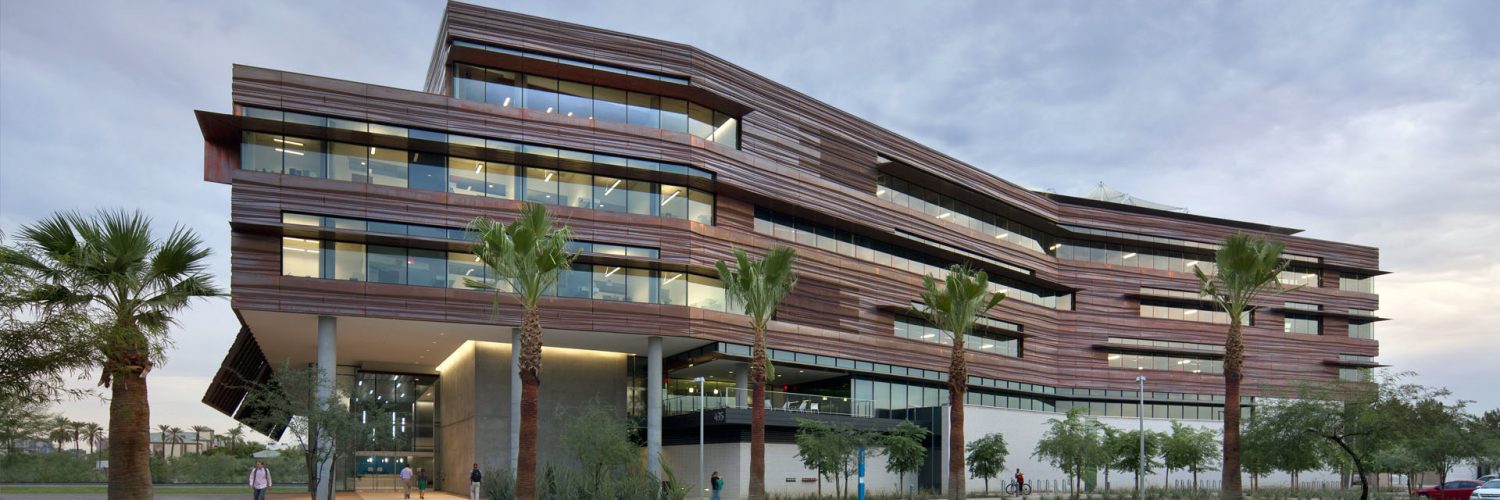
Individually, Arizona’s public universities are among the most innovative, entrepreneurial and visionary in the country.
Together, they are an unstoppable force for student success, economic growth and cutting-edge research capable of solving society’s greatest challenges.
The Phoenix Biomedical Campus is a crown jewel in downtown Phoenix and a leading catalyst in transforming our community into a nationally renowned hub of research, discovery and economic development. It is also a shining example of the power of partnerships through collaboration among the Arizona Board of Regents (ABOR), Arizona’s public universities, the City of Phoenix and private sector partners.
This state-of-the-art medical and bioscience facility in the heart of downtown Phoenix was established in 2004 in partnership with ABOR, Arizona State University, Northern Arizona University, the University of Arizona and the City of Phoenix.
The campus has evolved into a leading destination for medical research and education — creating jobs, spurring economic activity and positioning Phoenix as a global health-care leader.
Fifteen years after its inception, what started as a single six-story building has expanded into a dynamic 30-acre campus. World-class science and medical programs for Arizona’s three public universities, as well as the highest concentration of research scientists and health care professionals in the region, prepare students for in-demand careers.
To continue maximizing the vast potential of the campus, leaders from ABOR, the universities and the City of Phoenix are developing a comprehensive master plan, which includes a dozen future projects as well as the enhancement of campus synergies through strategic academic, research and business partnerships.
The board has engaged the leadership of former Regent Rick Myers to help spur development of the master plan and identify opportunities for further collaboration between the universities at the Biomedical Campus. I’m confident Regent Myers’ extensive experience in strategic planning and business development will catalyze our collaboration and advance us toward a robust master plan.
A UArizona-commissioned study credited PBC with creating 9,355 direct and indirect jobs and generating $1.3 billion in annual economic impact for Arizona in 2013. By 2025, the campus is expected to generate $3.1 billion in annual economic impact for the state.
The campus currently includes 1.6 million square feet of laboratories, classrooms, lecture halls and other physical space — with plans to reach 6 million square feet.
Here are some recent developments at the universities:
- A partnership between ASU and Wexford Science and Technology is building a new facility at Fourth and Fillmore streets that will include lab and clinical research space for the Biodesign Institute and ASU’s colleges of Health Solutions and Nursing and Health Innovation, as well as space for health and bioscience innovation and entrepreneurship. The $77 million, 225,000-square-foot project represents the first public-private partnership on the campus and is expected to generate new jobs in the health care and bioscience industries. This project, and the expansion of health fields downtown will enhance opportunities for students who major in a wide range of health care degrees from nursing to kinesiology.
- NAU has grown its programs at PBC to approximately 400 graduate students enrolled in professional health science programs. NAU at PBC educates students to fill high-demand positions in the health care field, including physician assistants, physical therapists, occupational therapists and athletic trainers. Both the physical therapy and physician assistant programs are highly-ranked by U.S. News and World Report. NAU will offer a clinical mental health doctorate program beginning fall 2020 to serve Arizona’s need for additional mental health providers, pending approval from the Higher Learning Commission.
- Pharmacy, public health, nursing, telemedicine, occupational therapy and physical therapy represent a portion of the programs at PBC through UArizona. With the UArizona College of Medicine – Phoenix training future physicians, the university is answering the need for additional doctors in the state. A new medical technology accelerator center called InnoVention will provide students with a space to quickly take ideas from mind to market through new devices, businesses or health policies. Future plans include growing graduate medical education programs to meet health-care needs, developing multidisciplinary centers of excellence and leveraging clinical partners to expand training opportunities.
Based in the heart of downtown, the Phoenix Biomedical Campus is a leading catalyst in the transformation of the city’s downtown into a vibrant metropolitan center, training health care professionals of tomorrow to care for future generations of Arizonans.
Karrin Taylor Robson is a native Arizonan, attorney and business leader. She is the founder and president of Arizona Strategies, a land-use strategy firm in Phoenix. Robson was appointed to the Arizona Board of Regents in 2017.
Photo by BenjaMurph via Wikimedia Commons.
















Add comment